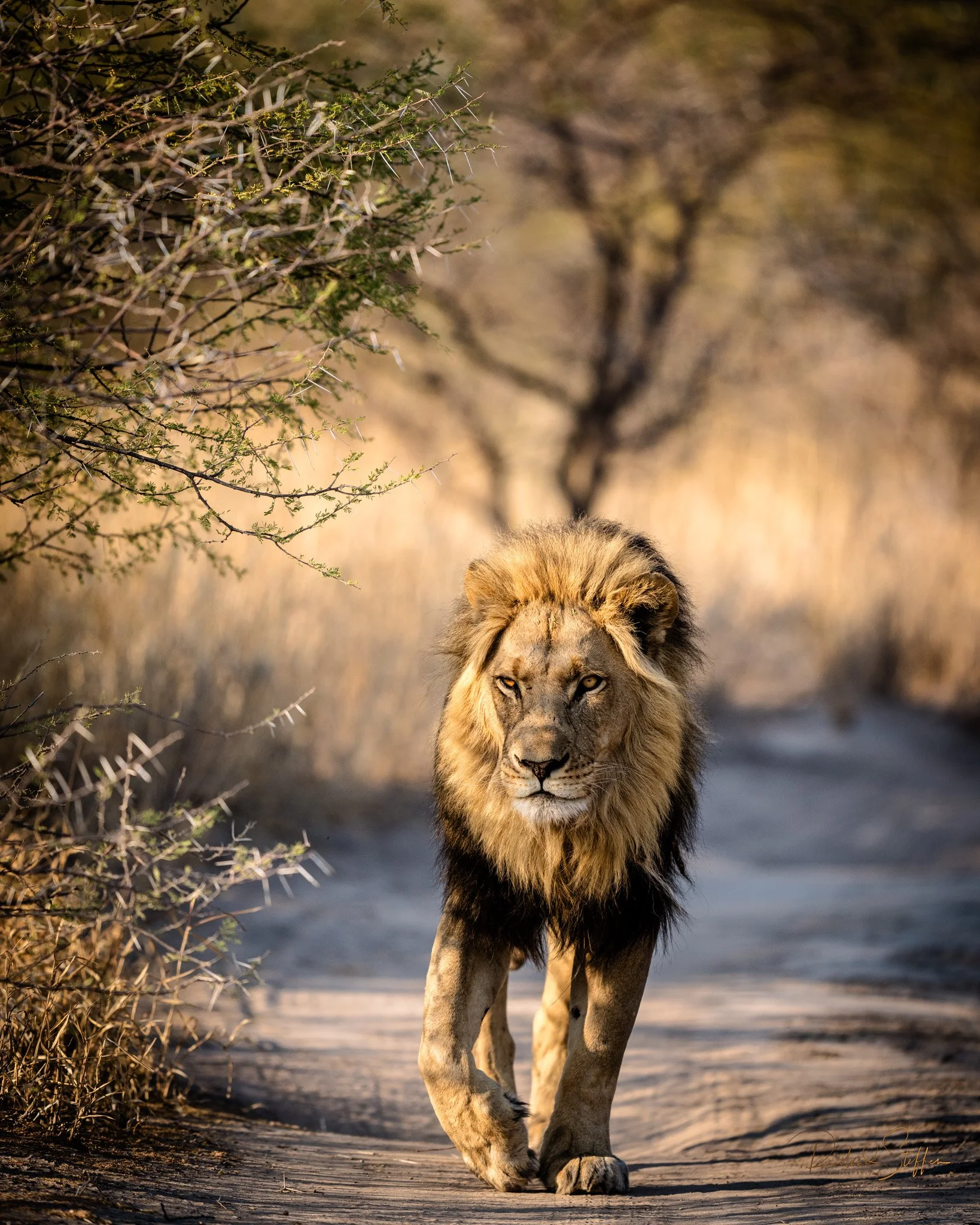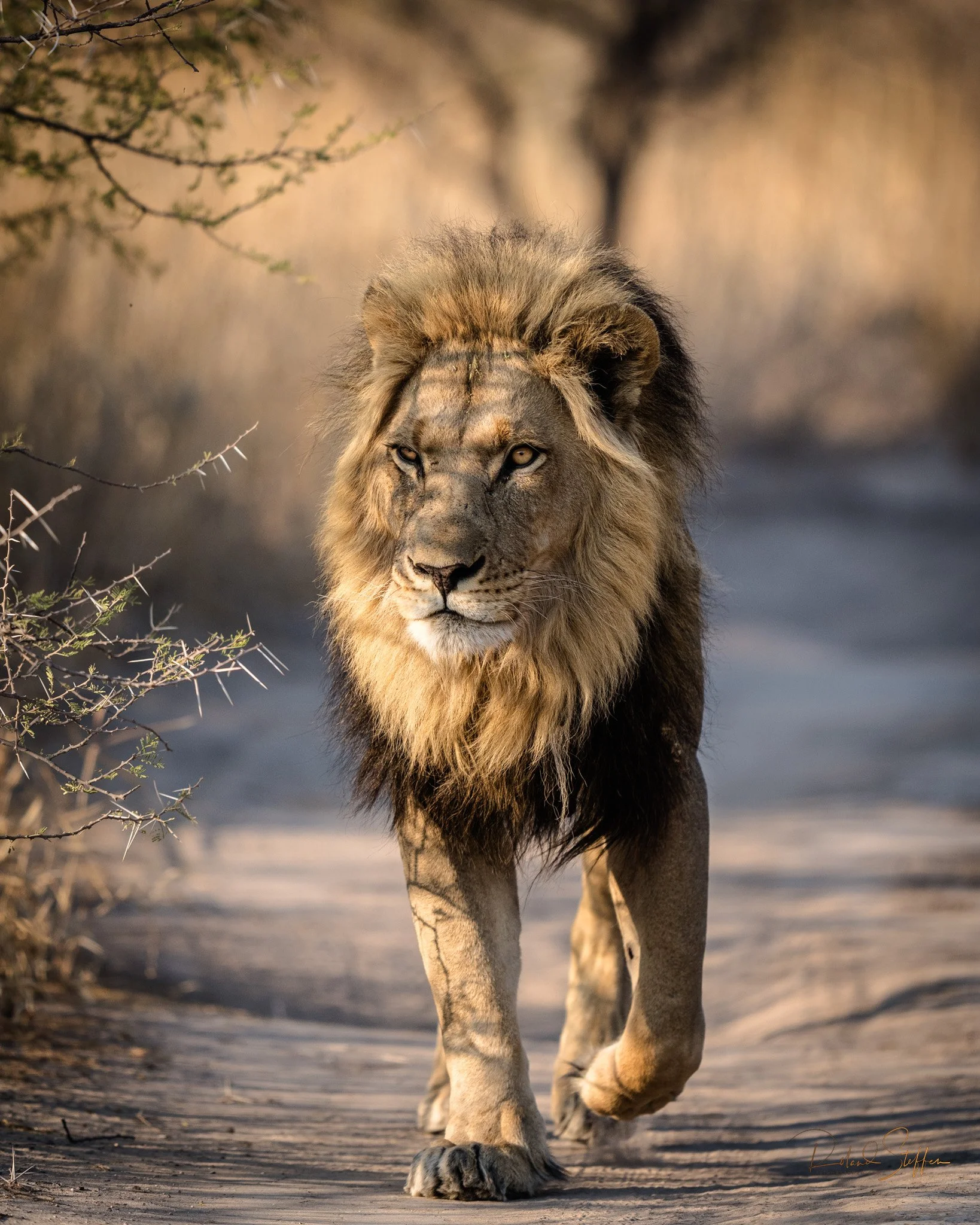The Majestic Black-Maned Kalahari Lion - a unique encounter
Black Maned Kalahari Lion, Deception Valley, Kalahari Desert, Botswana
It took us more than eight days in the Kalahari Desert in the south of Botswana, to find this rare lion with its typical black mane - the Black Mane Kalahari Lion. When it then suddenly stood in front of us in all its glory, it almost took our breath away. I have seen many lions in southern Africa in recent years, but this enormous large appearance simply beats everything I have seen so far. Here the name "Lion King" gets a whole new meaning. These lions only exist in the Kalahari Desert. Black-maned lions were one of the species that roamed the vast Kalahari from the earliest times. These magnificent big cats are so wonderfully adapted to this land of extremes and contrasts where the weather conditions can change dramatically from one hour to the next. Temperature can fluctuate from minus eight degrees celsius in winter to highs of between 40 and 50 degrees in summer. Factors like this make the Kalahari one of the most fascinating ecosystems in the world.
Photographer: Roland Steffen - Gear: SONY Alpha 1 with Sony FE 400mm f2.8 GM OSS. Pictures not to be used without my explicit permission.
„When this big boy suddenly stood in front of us in all its glory, it almost took our breath away. I have seen many lions in southern Africa in recent years, but this enormous large appearance simply beats everything I have seen so far.“
The vast expanse of the Kalahari Desert is home to a magnificent predator that reigns over the arid plains with awe-inspiring grace and power - the black-maned Kalahari lion. This majestic creature, with its striking appearance, possesses an essence that captures the hearts and imaginations of all who encounter it.
The most distinct characteristic of the black-maned Kalahari lion is, indeed, its lustrous jet-black mane. It cascades around its regal head like a crown, contrasting gracefully against its tawny golden fur. This incredible black mane serves as a symbol of pride and dominance, distinguishing these lions from their counterparts in other regions.
Black Maned Kalahari Lion, Deception Valley, Kalahari Desert, Botswana
Unlike the lions of the savannah, the Kalahari lion's black mane is not solely an aesthetic feature. It carries unique significance in the rugged desert environment where they reside. The intense heat and harsh sunlight of the Kalahari would normally scorch and fade the manes of other lions, but the black hue acts as a natural sunscreen, providing protection from the relentless rays.
What truly sets the black-maned Kalahari lion apart is not just its striking appearance but also its exceptional adaptability. Surviving in the arid conditions of the Kalahari requires resilience, strength, and an astute understanding of the land. These lions have evolved to endure the challenging scarcity of water and prey, basking in the glory of their ability to adapt and conquer adversity.
„The Majestic Black-Maned Kalahari Lion: A Symbol of Strength and Beauty“
As if nature itself carved them into perfection, their well-defined muscular bodies are built for hunting and survival. Their keen senses, acute hearing, and superior vision enable them to track their prey with precision and stealth through the expansive golden grasslands. The black-maned males, in particular, exemplify unparalleled strength and take charge of their prides with noble authority.
The black-maned Kalahari lion symbolizes not only physical strength but also inner majesty. Each roar echoes powerfully across the sweeping desert landscape, evoking a sense of awe in anyone privileged enough to hear it. Their roar reverberates through time, carrying the legacy of generations that came before them and serving as a reminder of the ancient wisdom embedded in their bloodline.
Black Maned Kalahari Lion, Deception Valley, Kalahari Desert, Botswana
But despite their formidable nature, the black-maned Kalahari lions exemplify a delicate balance within their social structures. Within the pride, they exhibit a tenderness and loyalty towards their mates and offspring. The males actively participate in the upbringing of their cubs, instilling in them the skills necessary for survival in this unforgiving wilderness.
The black-maned Kalahari lion is more than just a predator; it is an emblem of strength, beauty, and resilience. Its striking appearance and awe-inspiring presence leave a lasting impression on all who encounter it. As we admire this magnificent creature, let us strive to preserve its habitat and ensure its survival, allowing generations to come to witness the unparalleled beauty of the black-maned Kalahari lion.



